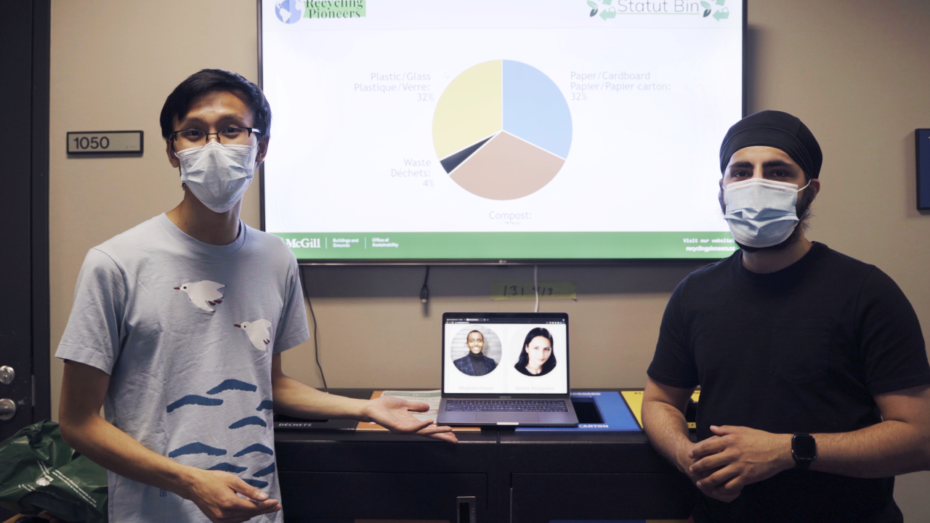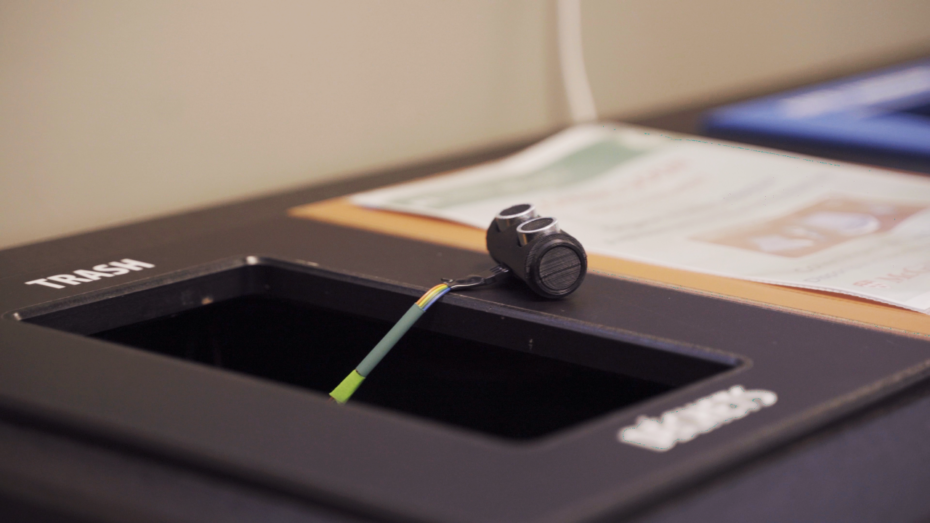
It’s a matter of convenience, says Kirk Lau.
“All waste problems boil down to the collective small decisions of hundreds if not thousands of people,” he explains. “In the battle of changing people’s habits, convenience is the greatest weapon because the easiest thing to do is what most people will do.”
Lau, a PhD candidate in materials engineering, and fellow students Arneet Kalra, Misghana Kassa, and Samina Alungulesa, are collectively the Recycling Pioneers, a team that has embraced the mission to tackle this issue one waste bin at a time. The team, working in collaboration with McGill’s Buildings and Grounds department, has innovated a smart waste bin system that will allow McGill to gain greater insight into the University’s waste streams and work towards its Zero-Waste by 2035 target.
“If [Buildings and Grounds] know where more trash is coming in and out, they can start to optimize how often things get taken out. They’ll actually be able to break down their waste streams,” says Lau.
Simplified sensor system
The system is simpler than other smart waste bin systems on the market, Lau explains. Rather than being built into the bins themselves, the Recycling Pioneers’ system works by retrofitting a series of sensors – both weight and distance sensors – that together provides the user with data about how full each bin is via a screen mounted above the waste sorting station.
“We’re trying to do more public facing and back-end approach, where we have a public facing component that tells the public what’s going on inside the bins but also provides data for Buildings and Grounds – any sort of facility management department – in order to let them know how waste is changing across a large geographic area, such as multiple buildings,” Lau says.
The team now looks forward to installing a similar system in five other buildings on campus.
“Once we have an ecosystem of sensors and the components working together, we can start tracking habits and comparing different faculties and different buildings to see how they compare with one another,” says teammate Kalra.
Improving both the communications around waste reduction and the tracking and monitoring of waste are cornerstone of Building and Grounds’ Waste Reduction and Diversion Strategy 2018-2025.
These efforts are essential to increasing the University’s diversion rate, or percentage of waste not sent to landfill. To achieve zero-waste, McGill aims to maintain the internationally recognized standard of a diversion rate of 90 per cent or more.
From McGill, for McGill
The Recycling Pioneers are a veritable McGill success story. The concept for the team’s smart waste bin system originated in the Faculty of Education’s goLEAD program, in which student groups are challenges to develop a sustainable solution to a real-life problem with the input of relevant stakeholders.

“The objective of the competition was to pitch an idea to tackle a problem affecting the campus,” explains Lau. “Pursuing our [initial] idea of a recycling rewards app helped us start conversations with many of the stakeholders on campus concerned with waste.”
“These conversations made us realize the need on campus for smart waste bins to better target some of the problems we wanted to address.”
With the proof-of-concept validated and a close contact with the Buildings and Grounds team, the team turned to McGill’s flagship Sustainability Projects Fund (SPF) to turn the idea into reality. The SPF is the largest fund of its kind in Canada, valued at $1 million annually, and has the mandate to build a culture of sustainability on McGill campuses through the development and seed-funding of interdisciplinary projects.
With support from the SPF, the Recycling Pioneers installed a first smart bin in the Trottier Building,
“We’re happy we were able to install a flagship station, but there are many improvements we would like to make to our system to make it easier to install so we could scale up to other buildings,” Lau says.
Complimenting academic experiences
The experience, the team explains, has complimented their academic experiences at McGill, enabling them to envision their role in the sustainability movement.
“From this project, I learned how to work on a larger scale project, something that takes months to do, whereas in my academics, usually we work on projects that last the course of a semester,” says Kalra. “We’ve been working on this since last summer and we see, especially during the pandemic, slow change but meaningful change. “
For Lau, the experience has redefined his career path.
“Working on waste-related projects is really fun and I’m definitely going to keep doing it,” he says. “It’s that simple.”
The Recycling Pioneers are looking for waste enthusiasts, electrical engineers, and mechanical engineers to join their team of student volunteers interested as they scale-up across campus. Interested students can get in touch by emailing recyclingpioneers3@gmail.com.
